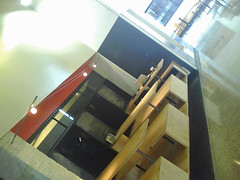Boston.
OK. 11.5 days of writing (I started on 23 May), for 14 hours straight on some days - all up I've been writing for about 143 hours so far, Word tells me (that's 12.5 hours per day, on average). 363 pages. 156,000 words. That's 1090 words per hour, but includes quotes, of course. 12 chapters written so far, and four more to go. If I haven't blogged for a while, it's because I've used up my allocation of words for the day.
 So, writing the produsage book is going OK, but it will need some editing - the final book is supposed to be only 300 pages, or 135,000 words. (Hey, I could stop right now...) Just as well, though, because it's not quite right in a few places yet, and I'm throwing in altogether too many quotes at times. That's always been an issue for me - lots of research, lots of interesting quotes from the research, and I'd love to use them all, but I can't let them overwhelm what I'm actually trying to say. So, I'm learning to throw out more than I'm using. Slowly.
So, writing the produsage book is going OK, but it will need some editing - the final book is supposed to be only 300 pages, or 135,000 words. (Hey, I could stop right now...) Just as well, though, because it's not quite right in a few places yet, and I'm throwing in altogether too many quotes at times. That's always been an issue for me - lots of research, lots of interesting quotes from the research, and I'd love to use them all, but I can't let them overwhelm what I'm actually trying to say. So, I'm learning to throw out more than I'm using. Slowly.